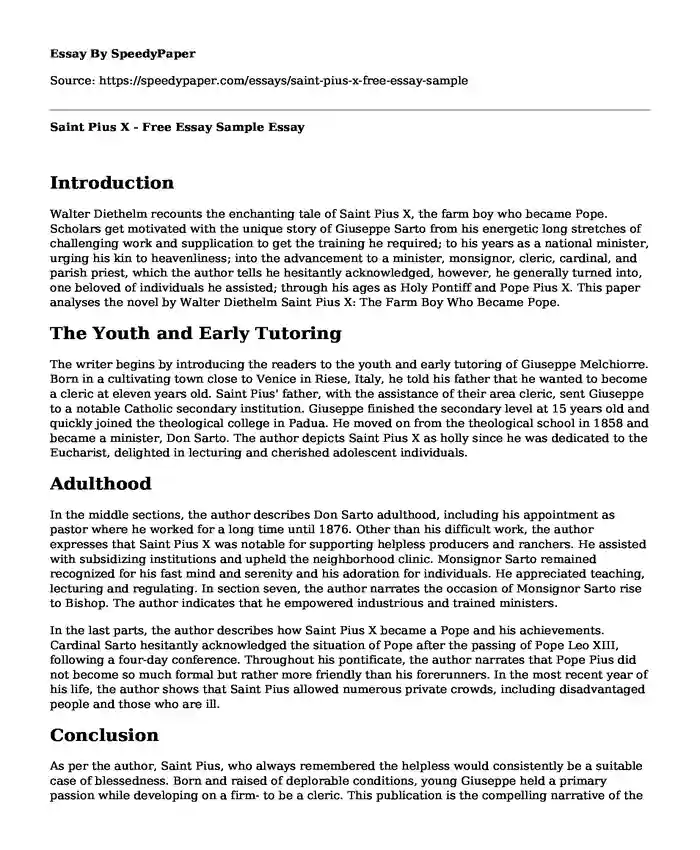Introduction
Walter Diethelm recounts the enchanting tale of Saint Pius X, the farm boy who became Pope. Scholars get motivated with the unique story of Giuseppe Sarto from his energetic long stretches of challenging work and supplication to get the training he required; to his years as a national minister, urging his kin to heavenliness; into the advancement to a minister, monsignor, cleric, cardinal, and parish priest, which the author tells he hesitantly acknowledged, however, he generally turned into, one beloved of individuals he assisted; through his ages as Holy Pontiff and Pope Pius X. This paper analyses the novel by Walter Diethelm Saint Pius X: The Farm Boy Who Became Pope.
The Youth and Early Tutoring
The writer begins by introducing the readers to the youth and early tutoring of Giuseppe Melchiorre. Born in a cultivating town close to Venice in Riese, Italy, he told his father that he wanted to become a cleric at eleven years old. Saint Pius' father, with the assistance of their area cleric, sent Giuseppe to a notable Catholic secondary institution. Giuseppe finished the secondary level at 15 years old and quickly joined the theological college in Padua. He moved on from the theological school in 1858 and became a minister, Don Sarto. The author depicts Saint Pius X as holly since he was dedicated to the Eucharist, delighted in lecturing and cherished adolescent individuals.
Adulthood
In the middle sections, the author describes Don Sarto adulthood, including his appointment as pastor where he worked for a long time until 1876. Other than his difficult work, the author expresses that Saint Pius X was notable for supporting helpless producers and ranchers. He assisted with subsidizing institutions and upheld the neighborhood clinic. Monsignor Sarto remained recognized for his fast mind and serenity and his adoration for individuals. He appreciated teaching, lecturing and regulating. In section seven, the author narrates the occasion of Monsignor Sarto rise to Bishop. The author indicates that he empowered industrious and trained ministers.
In the last parts, the author describes how Saint Pius X became a Pope and his achievements. Cardinal Sarto hesitantly acknowledged the situation of Pope after the passing of Pope Leo XIII, following a four-day conference. Throughout his pontificate, the author narrates that Pope Pius did not become so much formal but rather more friendly than his forerunners. In the most recent year of his life, the author shows that Saint Pius allowed numerous private crowds, including disadvantaged people and those who are ill.
Conclusion
As per the author, Saint Pius, who always remembered the helpless would consistently be a suitable case of blessedness. Born and raised of deplorable conditions, young Giuseppe held a primary passion while developing on a firm- to be a cleric. This publication is the compelling narrative of the unassuming Pope of little children, whose adoration for Christ and children prompted him to accommodate the necessities for the initial Communion with the goal that small children as ahead of schedule as seven years of age could get the Holy Eucharist.
Reference
Saint Pius X: The Farm Boy Who Became Pope, Walter Diethelm, OSB, Ignatius Press, 1994, San Francisco.
Cite this page
Saint Pius X - Free Essay Sample. (2023, Nov 24). Retrieved from https://speedypaper.net/essays/saint-pius-x-free-essay-sample
Request Removal
If you are the original author of this essay and no longer wish to have it published on the SpeedyPaper website, please click below to request its removal:
- Morality Battles Friendship in Of Mice and Men. Literary Essay Sample
- Chandra Manning Book Review, Free Essay for Everyone
- Essay Example on Napoleon Bonaparte: Enlarging the French Empire in 19th Century Europe
- Paper Example. The Wilderness by Les Murray and The Roaring Days by Henry Lawson
- Free Essay: Comparison Between Term Insurance and Permanent Insurance
- Christianity and Islam: Tensions Since Medieval Times - Essay Sample
- Essay Example on White Fragility-Robin DiAngelo. Main Argument in the Book
Popular categories





